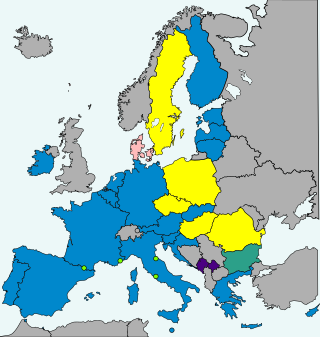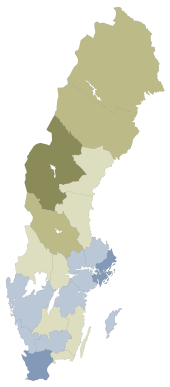
Euroscepticism, also spelled as Euroskepticism or EU-scepticism, is a political position involving criticism of the European Union (EU) and European integration. It ranges from those who oppose some EU institutions and policies and seek reform, to those who oppose EU membership and see the EU as unreformable. The opposite of Euroscepticism is known as pro-Europeanism.

Gösta Ingvar Carlsson is a Swedish politician who twice served as Prime Minister of Sweden, first from 1986 to 1991 and again from 1994 to 1996. He was leader of the Swedish Social Democratic Party from 1986 to 1996. He led Sweden into the European Union.
The Green Party, commonly referred to as Miljöpartiet in Swedish, is a political party in Sweden based on green politics.

Since the introduction of parliamentarism in Sweden, six national referendums have been held. Legal provisions for referendums were introduced in 1922, one year after the adoption of universal suffrage. The Constitution of Sweden provides for binding referendums, but all referendums held as of 2012 have been non-binding. The latest referendum, on adopting the euro, was held on 14 September 2003.

Referendums in the United Kingdom are occasionally held at a national, regional or local level. Historically, national referendums are rare due to the long-standing principle of parliamentary sovereignty. Legally there is no constitutional requirement to hold a national referendum for any purpose or on any issue. However, the UK Parliament is free to legislate through an Act of Parliament for a referendum to be held on any question at any time.

Iceland is heavily integrated into the European Union via the Agreement on the European Economic Area and the Schengen Agreement, despite its status as a non-EU member state. Iceland applied for membership in 2009. The Minister for Foreign Affairs sent a letter in 2015 that ended the application process.

This is a list of referendums related to the European Union, or referendums related to the European Communities, which were predecessors of the European Union. Since 1972, a total of 48 referendums have been held by EU member states, candidate states, and their territories, with several additional referendums held in countries outside the EU. The referendums have been held most commonly on the subject of whether to become a member of European Union as part of the accession process, although the EU does not require any candidate country to hold a referendum to approve membership or as part of treaty ratification. Other EU-related referendums have been held on the adoption of the euro and on participation in other EU-related policies.

Euroscepticism in the United Kingdom is a continuum of belief ranging from the opposition to certain political policies of the European Union to the complete opposition to the United Kingdom’s membership of the European Union. It has been a significant element in the politics of the United Kingdom (UK). A 2009 Eurobarometer survey of EU citizens showed support for membership of the EU was lowest in the United Kingdom, alongside Latvia and Hungary.

Sweden does not currently use the euro as its currency and has no plans to replace the existing Swedish krona in the near future. Sweden's Treaty of Accession of 1994 made it subject to the Treaty of Maastricht, which obliges states to join the eurozone once they meet the necessary conditions. Sweden maintains that joining the European Exchange Rate Mechanism II, participation in which for at least two years is a requirement for euro adoption, is voluntary, and has chosen to remain outside pending public approval by a referendum, thereby intentionally avoiding the fulfilment of the adoption requirements.

Carl Gösta Björn Joachim von der Esch was a Swedish Christian democratic politician, member of the Riksdag 1998–2006.

A non-binding referendum on introduction of the euro was held in Sweden on 14 September 2003. The majority voted not to adopt the euro, and thus Sweden decided in 2003 not to adopt the euro for the time being. Had they voted in favour, the plan was that Sweden would have adopted the euro on 1 January 2006.

The Liberal Democrats are a liberal political party in the United Kingdom, founded in 1988. They are based at Liberal Democrat Headquarters, near Westminster, and the current leader of the party is Ed Davey. They are the third-largest party in the United Kingdom, with 72 members of Parliament (MPs) in the House of Commons. They have 78 members of the House of Lords, four members of the Scottish Parliament, one member in the Welsh Senedd, and more than 3,000 local council seats. The party holds a twice-per-year Liberal Democrat Conference, at which party policy is formulated. In contrast to its main opponents' rules, the Liberal Democrats grant all members attending its Conference the right to vote on party policy, under a one member, one vote system. The party also allows its members to vote online for its policies and in the election of a new leader.

The 1995 enlargement of the European Union saw Austria, Finland, and Sweden accede to the European Union (EU). This was the EU's fourth enlargement and came into effect on 1 January of that year. It is also known as the EFTA Enlargement round. All these states were previous members of the European Free Trade Association (EFTA) and had traditionally been less interested in joining the EU than other European countries. Norway had negotiated to join alongside the other three, but following the signing of the treaty, membership was turned down by the Norwegian electorate in the 1994 national referendum. Switzerland also applied for membership on 26 May 1992, but withdrew it after a negative referendum result on 6 December 1992.

A non-binding referendum on the introduction of right hand traffic was held in Sweden on 16 October 1955.

The 2016 United Kingdom European Union membership referendum, commonly referred to as the EU referendum or the Brexit referendum, was a referendum that took place on 23 June 2016 in the United Kingdom (UK) and Gibraltar under the provisions of the European Union Referendum Act 2015 to ask the electorate whether the country should continue to remain a member of, or leave, the European Union (EU). The result was a vote in favour of leaving the EU, triggering calls to begin the process of the country's withdrawal from the EU commonly termed "Brexit".

The European Union Referendum Act 2015 was an act of the Parliament of the United Kingdom that made legal provision for a consultative referendum to be held in the United Kingdom and Gibraltar, on whether it should remain a member state of the European Union or leave the bloc altogether. The bill was introduced to the House of Commons by Philip Hammond, Foreign Secretary on 28 May 2015. Two weeks later, the second reading of the Bill was supported by MPs from all parties except the SNP; the bill subsequently passed on its third reading in the Commons on 7 September 2015. It was approved by the House of Lords on 14 December 2015, and given Royal Assent on 17 December 2015. The Act came partly into force on the same day and came into full legal force on 1 February 2016.
The European Union (Referendum) Bill 2013–14 was a private member's bill of the Parliament of the United Kingdom designed to make provision for a referendum on membership of the European Union to be held in 2017 following renegotiation of terms between the European Union and the United Kingdom government. The bill ceased to be considered by Parliament after January 2014 and did not become law. However, a subsequent bill with the same objective, the European Union Referendum Act 2015, was later introduced to the House of Commons by the newly elected Conservative government in May 2015 was passed and received royal assent on 17 December 2015.
The Bloomberg speech was an address on Britain's membership of the European Union, given in January 2013 by David Cameron, the then Conservative Party leader and Prime Minister of the United Kingdom. Although presented while the Conservative–Liberal Democrat coalition government was in office, it was given as a party political speech rather than one given on behalf of the UK Government, without the support of the Liberal Democrats.

A referendum on the Brexit withdrawal agreement, also referred to as a "second referendum", a "rerun", a "people's vote", or a "confirmatory public vote", was proposed by a number of politicians and pressure groups as a way to break the deadlock during the 2017–19 Parliament surrounding the meaningful vote on the Brexit deal.

Following a 2016 referendum, the United Kingdom exited from the European Union at the end of January 2020. Since leaving the EU, numerous polling organisations have conducted surveys to gauge public opinion on rejoining the organisation. The trend of the poll data shows that, over time, support for Brexit has waned, while public opinion in the UK has gradually moved in favour of rejoining the EU.













